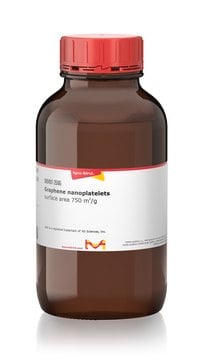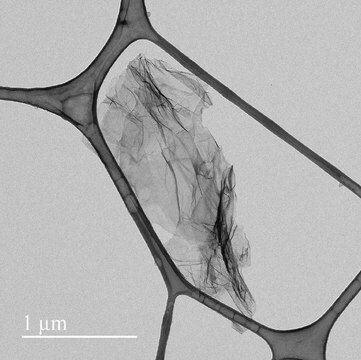719811
Carbon nanofibers
pyrolitically stripped, platelets(conical), >98% carbon basis, D × L 100 nm × 20-200 μm
Synonyme(s) :
PR-25-XT-PS, Conical carbon nanofibers
About This Item
Produits recommandés
Source biologique
platelets (conical)
Niveau de qualité
Pureté
>98% carbon basis
Forme
powder
Caractéristiques du produit alternatif plus écologique
Design for Energy Efficiency
Learn more about the Principles of Green Chemistry.
sustainability
Greener Alternative Product
P × L
100 nm × 20-200 μm
Superficie
54 m2/g
Impuretés
<14,000 ppm Iron content
Diamètre moyen
130 nm
Dimension de pores
0.12 cm3/g average pore volume
89.3 Å average pore diameter
Pf
3652-3697 °C
Densité
1.9 g/mL at 25 °C
Masse volumique apparente
0.5‑3.5 lb/cu.ft
Autre catégorie plus écologique
InChI
1S/C
Clé InChI
OKTJSMMVPCPJKN-UHFFFAOYSA-N
Vous recherchez des produits similaires ? Visite Guide de comparaison des produits
Description générale
Application
Notes préparatoires
Informations légales
Mention d'avertissement
Warning
Mentions de danger
Conseils de prudence
Classification des risques
Eye Irrit. 2 - STOT SE 3
Organes cibles
Respiratory system
Code de la classe de stockage
11 - Combustible Solids
Classe de danger pour l'eau (WGK)
WGK 3
Point d'éclair (°F)
Not applicable
Point d'éclair (°C)
Not applicable
Faites votre choix parmi les versions les plus récentes :
Déjà en possession de ce produit ?
Retrouvez la documentation relative aux produits que vous avez récemment achetés dans la Bibliothèque de documents.
Les clients ont également consulté
Articles
Pyrograf®-III vapor-grown carbon nanofibers are within the class of materials termed multi-walled carbon nanotubes (MWCNTs), and are produced by the floating catalyst method.
Composite materials that traditionally incorporate micron scale reinforcements in a bulk matrix offer opportunities to tailor material properties such as hardness, tensile strength, ductility, density, thermal and electrical conductivity, and wear resistance.
3D printing is a type of additive manufacturing that can be used to rapidly fabricate components with highly customizable geometries.
Notre équipe de scientifiques dispose d'une expérience dans tous les secteurs de la recherche, notamment en sciences de la vie, science des matériaux, synthèse chimique, chromatographie, analyse et dans de nombreux autres domaines..
Contacter notre Service technique






